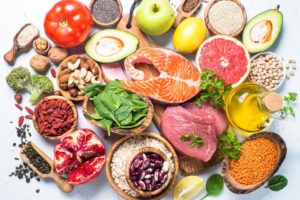
Food supplies micronutrients, such as vitamins and minerals, which don’t provide calories but help the body with chemical reactions. In addition, food is a source of water, fiber and other essential substances. Read on to learn more about the nutrients that your body needs to stay energized.
Carbohydrates
Carbohydrates can be simple or complex. Simple carbohydrates are the sugars found in fruits, honey, milk and milk products. They also include sugars added during food processing and refining. Simple carbohydrates are absorbed quickly for energy.
Complex carbohydrates, also known as starches, are found primarily in whole grains, pasta, potatoes, beans and vegetables. Digestion is required to change complex carbohydrates into simple sugars.
Complex carbohydrates contain many vitamins and minerals as well as fiber. During processing, however, complex carbohydrates may be refined, removing many important nutrients — along with their benefits.
Fats
Fats are a natural component of various foods, and they come in different forms. The oils used in cooking are a form of fat. Fats are also found in foods of animal origin, such as meat, dairy, poultry and fish, and in such common foods as avocados, nuts and olives. Fats are a major source of energy and also help your body absorb some vitamins.
Proteins
Proteins build and repair body structures, produce body chemicals, carry nutrients to your cells and help regulate body processes. Excess proteins also provide calories. Proteins are composed of basic elements called amino acids. There are two types of amino acids: those your body can generate, known as nonessential amino acids, and those that can only be obtained from the food you eat, known as essential amino acids.
Vitamins
Many foods contain vitamins, such as A, B complex, C, D, E and K. Vitamins help your body use carbohydrates, fats and proteins. They also help produce blood cells, hormones, genetic material and chemicals for the nervous system. Deficiencies of these vitamins lead to various diseases.
During processing, foods can lose nutrients. Manufacturers sometimes enrich or fortify the processed food and add back nutrients. Fresh, natural foods, though, contain vitamins in their preferred natural state.
Minerals
Minerals such as calcium, magnesium and phosphorus are important to the health of your bones and teeth. Sodium, potassium and chloride, commonly referred to as electrolytes, help regulate the balance of water and chemicals in your body. Your body needs smaller amounts of minerals such as iron, iodine, zinc, copper, fluoride, selenium and manganese, commonly referred to as trace minerals.
Water
It’s easy to take water for granted, but it’s a vital nutritional requirement. Many foods, especially fruits, contain a lot of water. Water plays a role in nearly every major body function. It regulates body temperature, carries nutrients and oxygen cells via the bloodstream and helps carry away waste. Water also helps cushion joints and protects organs and tissues.
Fiber
Fiber is the part of plant foods that your body doesn’t absorb. The two main types are soluble and insoluble, and fiber-rich foods usually contain both.
Foods high in soluble fiber include citrus fruits, apples, pears, plums and prunes, oatmeal and oat bran, and barley. Legumes, such as dried beans and peas, are also high in soluble fiber. This type of fiber helps lower blood cholesterol, slows the rise in blood sugar and adds bulk to stools.
Insoluble fiber is found in many vegetables, wheat bran, and whole-grain breads, pasta and cereals. Insoluble fiber also adds bulk to stool, stimulates the gastrointestinal tract, and helps prevent constipation.


